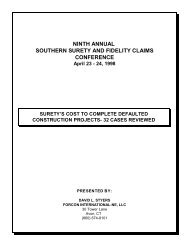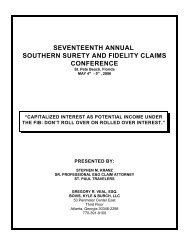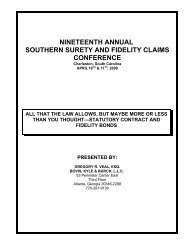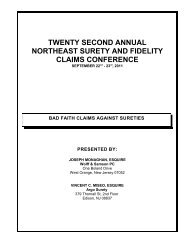financial guaranty bonds and the appleton rule - Forcon International
financial guaranty bonds and the appleton rule - Forcon International
financial guaranty bonds and the appleton rule - Forcon International
You also want an ePaper? Increase the reach of your titles
YUMPU automatically turns print PDFs into web optimized ePapers that Google loves.
FINANCIAL GUARANTY BONDS<br />
AND THE APPLETON RULE<br />
INTRODUCTION<br />
1<br />
As a general proposition, under <strong>the</strong> New York Insurance Law, only “<strong>financial</strong> <strong>guaranty</strong><br />
insurance corporations” are permitted to write <strong>financial</strong> <strong>guaranty</strong> insurance. Such <strong>financial</strong><br />
<strong>guaranty</strong> insurance corporations are called “monoline” insurers because <strong>the</strong>y are permitted to<br />
write essentially only one line of business – <strong>financial</strong> <strong>guaranty</strong> insurance. “Multiline”<br />
companies, by contrast, are generally prohibited by <strong>the</strong> New York Insurance Law from issuing<br />
coverages defined as <strong>financial</strong> <strong>guaranty</strong> insurance. The statute carves out from <strong>the</strong> general<br />
proscription certain types of “surety insurance” which multiline insurers may write. Moreover,<br />
although <strong>financial</strong> <strong>guaranty</strong> insurance is to be written by monoline insurers, those insurers are<br />
also permitted to issue certain additional coverages including <strong>the</strong> types of “surety insurance”<br />
which multiline companies are allowed to write. By <strong>and</strong> large, however, only monoline insurers<br />
may issue <strong>financial</strong> <strong>guaranty</strong> insurance in New York, <strong>and</strong> multiline companies – whe<strong>the</strong>r<br />
incorporated in New York (domestic) or incorporated in ano<strong>the</strong>r state (foreign) or ano<strong>the</strong>r<br />
country (alien) but licensed in New York – may not.<br />
New York’s proscription of <strong>the</strong> writing of <strong>financial</strong> <strong>guaranty</strong> insurance by a multiline<br />
company is given extraterritorial effect by operation of <strong>the</strong> so-called “Appleton Rule.” The <strong>rule</strong><br />
was originally promulgated as an administrative regulation in <strong>the</strong> early 1900’s by <strong>the</strong> Deputy<br />
Superintendent of <strong>the</strong> New York Department of Insurance after whom it is named <strong>and</strong> was<br />
2<br />
enacted as part of <strong>the</strong> New York Insurance Law in 1939. Essentially, <strong>the</strong> Appleton Rule<br />
prohibits a foreign or alien insurer from conducting outside of New York any kind of insurance<br />
business which it is not permitted to conduct in New York under pain of losing its New York<br />
insurance license. In <strong>the</strong> context of New York’s <strong>financial</strong> <strong>guaranty</strong> insurance statutes, <strong>the</strong><br />
Appleton Rule means that a foreign multiline insurance company may not issue in any state a<br />
product which comes within <strong>the</strong> New York definition of “<strong>financial</strong> <strong>guaranty</strong> insurance” – at least<br />
if it wishes to become or remain licensed in New York.<br />
The prohibition against <strong>the</strong> issuance of <strong>financial</strong> <strong>guaranty</strong> insurance by multiline<br />
companies does not extend to <strong>the</strong> reinsurance of <strong>financial</strong> <strong>guaranty</strong> risks. Monoline insurer’s<br />
may cede such risks to properly accredited property <strong>and</strong> casualty companies or o<strong>the</strong>r<br />
reinsurers. Thus, multiline companies may assume through reinsurance <strong>financial</strong> <strong>guaranty</strong><br />
risks which <strong>the</strong>y are prohibited from writing directly. In <strong>the</strong> context of reinsurance, <strong>the</strong> issues<br />
involve underst<strong>and</strong>ing <strong>and</strong> complying with complex, highly technical requirements regarding<br />
1<br />
The New York Insurance Law is contained in Chapter 28 of <strong>the</strong> Consolidated Laws of New York. Chapter 28 is divided into 57<br />
Articles. Provisions from <strong>the</strong> following four Articles are discussed herein: Article 1 (General Provisions), Article 41<br />
(Property/Casualty Insurance Companies), Article 11 (Licensing of Insurers), <strong>and</strong> Article 69 (Financial Guaranty Insurance<br />
Corporations). All statutory provisions cited are from McKinney’s Consolidated Laws of New York Annotated as contained in<br />
WESTLAW. As of this writing, <strong>the</strong> WESTLAW database for <strong>the</strong> four Articles discussed, is current through L.2000, chs. 2 to 23,<br />
52. Unless o<strong>the</strong>rwise indicated, all citations to New York statutes are to that database <strong>and</strong> <strong>the</strong>refore will not include <strong>the</strong> currency<br />
of <strong>the</strong> database.<br />
2<br />
Martha L. Perkins, Financial Guaranty in THE LAW OF SURETYSHIP, 303, 311 (2d ed., Edward G. Gallagher, ed., 2000). The<br />
Appleton Rule is now codified as N.Y. Ins. Law §1106(f).<br />
2






